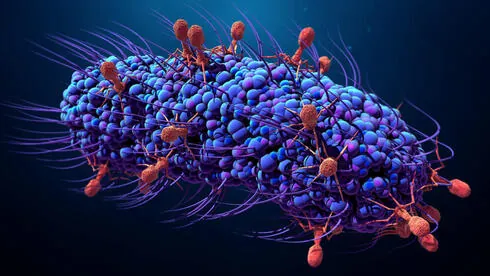
Alien Bacteria Uncovered on China's Tiangong Space Station!
2025-06-01
Author: Kai
Out-of-This-World Discovery: New Bacteria Species
In a groundbreaking revelation, scientists from China have announced the discovery of a brand-new species of bacteria that thrived aboard the Tiangong space station. This exciting find stemmed from genetic tests conducted on samples collected by crew members nearly two years ago, revealing a unique bacterium named Niallia tiangongensis, after the space station itself.
Surprising Survival Strategies in Space!
This extraordinary bacterium showcases fascinating characteristics that might redefine our understanding of life in extreme environments. Notably, it boasts an exceptional capability to form biofilms—three-dimensional clusters that offer protection against various environmental threats. It also demonstrates resilience against oxidative stress, meaning it can withstand high levels of reactive oxygen molecules that can wreak havoc on biological systems. Recent research has highlighted its impressive DNA repair mechanisms, underscoring its survival prowess under the harsh conditions of outer space.
Adapting to the Unknown: Feasting on Gelatin!
While many of its remarkable traits were inferred through genetic profiles, researchers directly observed the bacterium’s enhanced ability to break down gelatin. This skill suggests it can utilize limited food sources to its advantage, opening up potential applications for humans, especially during long-term space missions.
Protecting Astronauts and Spacecraft!
The study emphasizes the crucial need to understand microbial life in space to safeguard astronaut health during extended missions. Accumulating bacteria could clog essential systems such as water pipes or oxygen tanks, posing serious operational risks. By investigating how these microbes evolve in space, researchers aim to find ways to harness their adaptive responses for various applications on Earth and beyond.
A Microbial Paradise in Space?
Although space is often perceived as inhospitable due to microgravity and radiation, these factors create surprisingly stable environmental conditions that could be advantageous for microbes. The Tiangong station is not the only one witnessing microbial intrigue—on the International Space Station (ISS), scientists have tracked antibiotic-resistant species capable of evolving rapidly.
The Dirty Truth About Clean Rooms!
The quest for cleanliness in space environments is more complex than meets the eye. A study has uncovered 26 previously unknown bacterial species lurking in supposedly sterile clean rooms, highlighting how extreme conditions might inadvertently favor the survival of these organisms. These findings raise concerns about the transfer of Earth microbes to extraterrestrial environments, emphasizing the need for more stringent sterilization practices.
The Future Awaits: Harnessing Space Microbes!
As we delve deeper into the mysteries of microbial life in space, the potential benefits are immense. Harnessing the resilience of these organisms could lead to groundbreaking innovations in medicine, food preservation, and even waste recycling—transforming our approach to both space exploration and earthly challenges.



 Brasil (PT)
Brasil (PT)
 Canada (EN)
Canada (EN)
 Chile (ES)
Chile (ES)
 Česko (CS)
Česko (CS)
 대한민국 (KO)
대한민국 (KO)
 España (ES)
España (ES)
 France (FR)
France (FR)
 Hong Kong (EN)
Hong Kong (EN)
 Italia (IT)
Italia (IT)
 日本 (JA)
日本 (JA)
 Magyarország (HU)
Magyarország (HU)
 Norge (NO)
Norge (NO)
 Polska (PL)
Polska (PL)
 Schweiz (DE)
Schweiz (DE)
 Singapore (EN)
Singapore (EN)
 Sverige (SV)
Sverige (SV)
 Suomi (FI)
Suomi (FI)
 Türkiye (TR)
Türkiye (TR)
 الإمارات العربية المتحدة (AR)
الإمارات العربية المتحدة (AR)